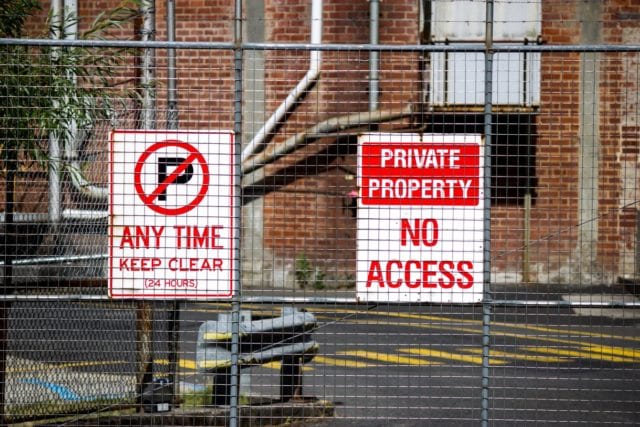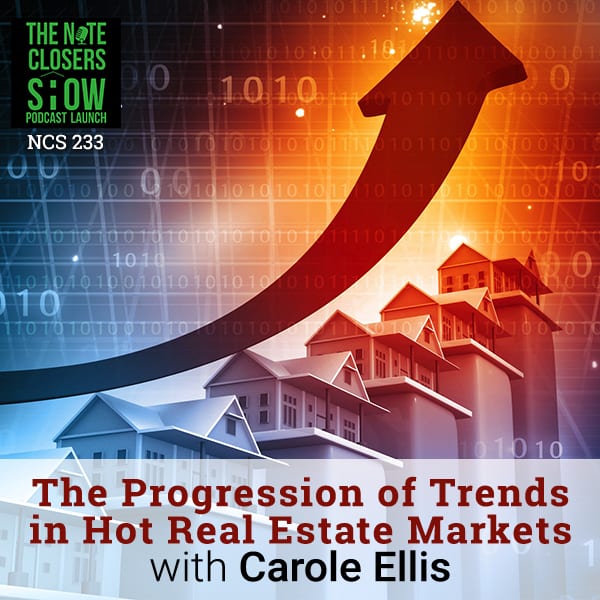
Private property rights are always the most attractive offer a note investor has. Hot real estate markets are markets that solve problems by looking for what the client needs, whether those needs are affordable housing or luxury condos. Understanding the natural progression of the note business can help investors pull the market apart to see the strategies that were used to find and close deals. Carole Ellis of Think Realty Magazine helps investors with this kind of analysis in the market by pulling it apart and figuring out how that market fits together.
—
Listen to the podcast here
The Progression of Trends in Hot Real Estate Markets with Carole Ellis
We’re very honored to have somebody join us from the East Coast, somebody who’s got a ton of experience, a ton of great stuff that she’ll be sharing with you. We are honored to have our guest, my friend, Carole Ellis.
Hello.
For those who don’t know, Carole serves as the Editor-in-Chief of Think Realty Magazine. It’s the only monthly print publication specifically designed for real estate investors, found in the newsstand. She is also Vice President of Research and Analysis for Self-Directed Investor Society. That’s a private association for investors exploring alternative assets. You host the popular nine-minute educational podcast REI.Today. Thank you for being here with us. The first thing I want to ask you is what’s your favorite thing that you do? You wear a multitude of hats and doing a variety of things with things. What’s your favorite thing that you do in real estate these days, Carole?
I wear a lot of hats but fortunately, I get to do the thing I like the best in all of them, which is that I really like to take things apart. I like pull markets apart. I like to look at strategies. I like to see how everything really fits together. Every single thing that I do basically hinges on that. I get to do what I love all day long.
One of the great things that we always love to talk about is the markets and being note investors, we’re a little bit different because we like going with the distressed markets. You’ve been doing a series and have been sending a lot of emails out and asking me about some of the different markets that we invest in. What are you seeing across the board? Is there anything that’s surprising you in the different markets out there that you’re diving into?
One thing that we did do that actually you being in Austin made me think about a little bit is we are working on big analysis of Texas as a state, which I just had a really good time doing because it’s pretty hard to think of Texas as a state in terms of a market. This guy at The Fed actually recently said, “Texas has evolved beyond the housing cycle.”He’s not the only one who said it. There are a lot of economists out there saying the same now, too. Basically, barring some international catastrophe, they think that Texas, and to a lesser degree the US housing market, on a national level is actually going to just keep evolving upward theoretically, which is a pretty scary thing to say. It’s really interesting because it completely changes what investors should be looking at. Instead of looking at “Where in the peak are we?”we may need to start looking much more broadly, which savvy investors have already been doing for years at politics, at legislation, all of those things that affect us maybe on a lag but very, very directly.
They’re saying that they don’t see a downturn provided that we don’t see a national catastrophe, a 9/11 or a large terrorist attack or anything like that, right?
I oversimplified that a little bit. Obviously, there are hot markets, the West Coast. Anywhere that’s limited by geography and affordability, is in a best case scenario going to plateau and in a worst case scenario, still going to go up and down. In places like the Southeast where cost of living is relatively much lower, places like Texas where cost of living relative to where the West Coast folks are coming from, still much lower and more affordable. They have the potential to really climb upward, may go up. That’s the argument right now. It’s awfully good-sounding as a real estate investor but I also feel like anytime you hear some people don’t like the way it sounds, that’s when you need to start looking for holes.
I keep saying that, “This has been great. The housing market is coming back strong.”If you look at states like Florida, we’re doing a lot of money in Florida over the last few years. We’re buying at the right time or actually the peak of a valley, and ride it back up there. It’s also nice seeing areas like Birmingham and other parts of these states recovered and coming really strong, too. It makes for opportunities for a lot of investors. We’ve always dealt with a lot of California investors looking back east to make some money because they can’t afford anything out there. If people are investing in Missouri, it’s been always an attractive thing or here in Texas. As we say, Austin is California East. Austin is where the Orange County, in LA, people sell their house and move with $1 million in the bank and they have their house there.
They buy entire portfolios. Recently, one of our cover features was talking to me about how he decided to pull everything out of California and go to Florida just because he could double his money without even having to double his capital. He was just getting two for one basically.
You’re saying that’s what investors are looking in other markets. You did a piece on international investors and things like that, looking into the US. What’s so attractive over here? What’s drawing them over here to the States?

Hot Real Estate Markets: Regardless of where you sit on the political scale, our private property rights are more protected than just about anybody’s.
Private property rights will always be our most attractive offering regardless of what our market is doing, in my opinion. Regardless of where you sit on the political scale, our private property rights are more protected than just about anybody’s. Especially if you’re looking to put money into somewhere where you can actually own your own home as opposed to return it to government every 40 years, which is a real thing, it’s hard to put a real price on that. When you also have a large amount of capital that you’re working with, it’s really just hard to argue with that. As US investors, we have to watch that because if you get a market that’s really inundated with foreign investors, you can see it in Miami, you can see it to a degree in the luxury listings in New York. They’re not playing by our rules and they shouldn’t because they have a different set of priorities. We can’t use our priorities to make all of our investing decisions if you get into a market like that where there’s a lot of foreign money.
What’s your take on the reverse aspect of more Americans investing in other areas of the world? We have a lot of people talking about going down to Belize or Costa Rica and things like that and want to be expatriates down there, starting to purchase properties. The third world countries are up and rising countries for the most part. Do you see a lot of that happen?
I think the same rules really apply. If I’m buying in Belize because I want to retire there or I think it’s a good way to diversify, things like that, that’s fine but maybe or maybe not it makes sense to buy in Belize because I want a 10% appreciation. You just can’t apply the same rules unless you also happen to be an expert in diplomacy and foreign policy and know how to do that. I think most investors are not necessarily. They’re better with the hard numbers.
What’s the biggest driving factor that you’re seeing in a lot of the areas that are up and coming? Is it creation of jobs? Is it tourism? I know every area is a little bit different for the most part but are you seeing a lot of that stuff really helping drive people to live there besides just affordability?
I really think that it’s not just affordability but it’s availability which is a great position for somebody who is either creating or buying and selling private notes to be in. Every single positive thing that everybody is saying right now about the housing market has two caveats. Global disaster and can the buyers who need to buy put themselves in a position to buy? Those buyers are predominantly millennials and first-time homebuyers. They desperately want to buy. In every survey, more and more of them, something like two-thirds of millennials now think they need to start their own household in their own house, which is huge shift. Even if they would pay on them, they can’t necessarily access that conventional financing. I think it’s a really wonderful area of opportunity. Whether you’re going to be the lender or you’re fixing and flipping or something like that, you have to find somewhere where somebody is willing to loan them money and where they can afford to make those payments once they get a hold of the money.
We do a lot of studies on states and then other lenders trends. When you look back ten years ago, you could fog a mirror and get a mortgage. I know some people, their dog bought a property because they were just giving credit out left and right. We still haven’t seen the purse strings loosen up from the financing houses for the most part to be able to re-cater back to the first-time homebuyer. There was an article that came out on HousingWire and DSNews about Flagstar and a few other lenders out there that are giving the down payment required for FHA. They’re literally gifting the 3.5% to first-time homebuyers. People are getting0% down which is crazy, in areas that are a little rougher. Then you look at the markets, especially in Austin, we just don’t have any inventory. That’s why I think a lot of people are getting priced out of the market or first-time homebuyers can’t afford a $295,000, $300,000 house waiting tables. It’s interesting to see what the banks are doing. I am seeing a few housing communities in different areas of the country that I’ve been driving around where they’re offering $500 down and I’m just like, “I want to know who that lender is so I could buy a bad debt in six months.”We’ve seen a trend. Notes have been attractive. I think you guys have seen that with the magazine, too, a little bit more so of people looking for more information on the notes stuff versus the fix and flip. Would that be what you’re seeing, too?
Yeah. There’s a natural progression. If you get started in real estate, assuming you’re starting with no capital or little capital, you’ll probably close sales and deals, then you rent and fix and flip. Then there’s a point at which you’re probably starting to think about getting hard money, you’re getting hard money. It only makes sense once you start seeing what kind of vetting a hard money lender or a private note lender does on you. You’re like, “This is really good. It’s secured by real estate but I don’t have to do the real estate.” It’s incredibly attractive. It’s natural. Svenja Gudell, Zillow’s Chief Economist, was on our January cover. She said, “If you want to see where to go next, look for the gap.”Whether it’s affordable housing, whether it’s luxury condos, whatever it is, look for the need because that’s where the real estate investors will solve the problem. That’s where they’ll go. Notes is where it is, I think.

Hot Real Estate Markets: If you want to see where to go next, look for the gap.
Ten years ago, I’d been very happy vetting on it, I’m still happy vetting on it, too. I do see that. The note side is really worth six to twelve months where most people are versus the fix and flips, especially the defaulted side. Then also the owner-financed notes, I think a lot more people are going to be diving and buying a lot of that as long as the stuff is underwritten effectively. That’s always the thing that scares people. Is it going to be written effectively based on CFPB or is it going to be written on a napkin at night? We talked about private investors. Talk a little bit about what you are doing with the SDIRA Investor.
SDI, Self-Directed Investor Society and our investors, we do talk a lot about real estate but our investors are really anyone who is looking to get out of Wall Street and look at alternative assets either through self-directed IRAs, self-directed 401(k)s. They’re basically seeking that control that comes with not handing over all your funds to financial advisers and holding your nose and hoping for the best. We are in a very unique position because we are not custodians, we are not administrators. There are a lot of things that any retirement professional is legally not allowed to get advice about owner-financed notes or any of that stuff. They can’t say, “That’s not looking too good for you,” or “That’s a really good move. You should do that.” They can’t say that. Bryan and the Self-Directed Investor Society is in a very unique position because we can do the research and tell you exactly what we think. I don’t have to be bound by anything if I don’t like a market even if everybody else does. I can just say it, “I wouldn’t buy there. That’s my opinion.”
It’s good to be able to voice that opinion versus be tied down. Everyone’s like, “Buy here. Buy here.” I’m like, “It’s as high as it’s ever been. Why buy there?”
If it’s already on a top ten list, then it might be a little too late. You might want to think somewhere else.
You’ve been writing on a lot of different cities. What’s been probably the most surprising market that bucks the system that you’ve been looking into? What’s one that’s really caught your attention like, “I didn’t even think about that or I didn’t know that?”
As a matter of fact, we did something in our January issue. We did Top Markets for Real Estate Investors and basically what we did was we pulled hot markets from other lists and then tried to look at them from an investor’s perspective. A lot of the West Coast fell off because you have to either have some very good connections or some really good strategy to invest there. We kept Seattle, obviously we kept Austin. I live in Atlanta so I like the Southeast anyway, but Tennessee, North Carolina, those are starting to show up on those lists but they’re still not very high up. There’s so much potential but they don’t get as much press as the Westville, for example, where people default to thinking, “I can buy in the Midwest. That’s affordable.”There are still some very major metro, first and second tier cities in the Southeast that have a lot of room to go up.
I would totally agree to that. I was out in Nashville recently and that city has blown up like crazy. It’s hard to find anything there. Nashville has always been the gem of Tennessee for the most part. Chattanooga has got a lot of good stuff going through it. Memphis has always been a renter’s market and doing well out there. I would agree that you see a lot of Atlanta. Do you think Atlanta has recovered? I would say so for the most part from a downfall but still a lot of marketing going around there, Augusta, Savannah. South Carolina is doing tremendous.
Raleigh started to really pop up a lot. Those commuter areas are still very accessible to an investor even if they’re not working with a lot of capital or vast amount of experience.
What are some of the biggest mistakes that you see people making out there, whether it’s investing in the markets or just dumb headed things that people are doing these days? I’m sure you probably get a lot of stories coming from both the Think Realty side and the Self-Directed Investor Society.

Hot Real Estate Markets: No matter what the horrible thing is, it always comes down to somebody who didn’t read enough of the fine print.
One of our big things that I’ve been working on is Think Realty is having an event in Dallas at the end of February in the 24th and the 25th and we are actually interviewing all of our speakers basically to create some additional content for other people to read before they come to be prepared. That was one of the things we asked them, “What’s the worst thing you ever saw somebody do?” because you always get good stuff like, “Somebody knocked down the wrong property or use Google Maps”. It all comes back to research and due diligence. At the end of the day, no matter what the horrible thing is, “I bought the wrong house and it was burned down,” or “I hired somebody who didn’t exist to manage my rental,” whatever it is, it always comes down to somebody who didn’t read enough of the fine print. There are so many good locations for finding the fine prints and you don’t have to go look it all up on your own. It’s just a shame. It hurts when you read this stuff because it’s always a question of verification, research, and due diligence.
We had a student who bought a portfolio of three notes and he sent realtors out and the realtors drove by the wrong house. He was all excited and then when he drove by the house, he said, “This isn’t a house.” It was the shack next door. Then he goes, “I now have to make sure that realtor takes a picture of the street number or the house number so we can verify this.” It’s little things like that, looking and verifying that because I’ve looked at houses on Google Maps, you look for that little dot, that little dot is not accurate.
That’s the thing. You need somebody to say something like what you just said, “Have your realtor to take a picture of the house number.” So often it’s this really simple stuff and people just aren’t looking for the educator and the education as well as the ROI, whatever number somebody is throwing at you that you like.
Let’s talk a little bit about Think Realty expos because I have been part of that in the past, but I’m just not travelling as much. You are doing four or five expos a year now, is that about right?
They’re doing four big ones. There is one in Dallas in February 24th and 25th and then they’re going to Irvine and Baltimore and they’ll wind up in Atlanta, which is where they always do their last one. They do their big awards ceremony there.
Aren’t they doing the international one anymore?
They did past August. I’m not sure exactly what they’re doing as far as their international presence goes.
You and Bryan, you do a lot of local investment in Atlanta and you invest in different markets. What’s your bread and butter that you love so much?
We would love to invest in Atlanta. We do not presently. At the end of the day, a lot of it is a question of having somebody that you really trust to manage that stuff. Bryan, probably back in the early 2000s, was a huge landowner in South Atlanta. He owned a lot of rental properties, did a lot of pre-financing stuff. Unfortunately, he got out of most of that before the housing market crashed. After that, we really had a winding down. We had a private equity fund in Stockton that we really were happy with, but we got to the point where we didn’t feel like that market was predictable enough. If you look at it right this second, it’s still looking pretty nice but when you’re flipping things and trying to fix stuff up, you don’t necessarily know what’s going to happen six months down the road. We had that and we did also do a lot in Birmingham for a while. I love Birmingham. It’s a great city and great affordable housing program. There’s a lot of stuff there. When I first read about it, I turned up my nose a little bit. Then later, I was very ashamed of myself because it’s such a great place to invest and there are a lot of good companies over there doing a lot of really good stuff in terms of putting people in houses that they couldn’t afford otherwise.
I’ve been a fan of Birmingham for a while of things like that. I know that you and Bryan have evolved with the investments because the market has changed. I think I met Bryan close to five years ago. He was a teaching a class. He actually came out for a couple of days to visit a little bit and had a good time. I’ve always admired how Bryan has marketed his business as well, doing a great job of writing the content, of taking articles and having a blog out and giving his opinion on it and letting everybody else make their own opinion. It’s a great philosophy and it’s obviously helped with evolutions of the business. If you’re doing any types of marketing and you’ve got to make a pivot point, marketing is the one thing that saves everybody for the most part.

Hot Real Estate Markets: If you’re doing any types of marketing and you’ve got to make a pivot point, marketing is the one thing that saves everybody.
He’s really leveraged that skill. He’s in that privileged position of being an educator, he is one of the premier experts in the country on it. The California Bar Association actually tapped him out to do a webinar about self-directed investing for its members because there isn’t anyone better to explain it. He is really leveraging a lot of the stuff that he did, at one point, use as marketing to forcefully make things very clear. As a self-directed investor, you can hang yourself. That’s your right. You can absolutely hang yourself out to dry and there isn’t anybody to stop you. You need somebody to really lay it out the way it is.
You sent me some emails about some markets that I’m not familiar with. Are there any markets that you’re looking for a little feedback that we can push out to our audience if they know somebody that could comment on or anything like that? Will you help our note tribe help you?
I would love to help your note tribe help me. We’ve got one, Iowa, and that’s particularly interesting to me because it consistently turns up as one of the places with the highest quality of life regardless of anything else that happens to be going on in Iowa. I’m really interested in either drawing or conclusively not drawing if we have to, but I’d rather draw a correlation between that and its investing strategies there; any insight on that. Of course, we will talk about the entire DC Baltimore area very soon. We’ve got a California breakdown coming out like the Texas one that we’re about to send out. I want to hit as many markets as we can that are newsworthy and relevant. It doesn’t have to be Los Angeles or San Francisco. It is relevant to investors especially if not everybody knows it and somebody is willing to crack the code. I really want to know because that’s really what we’re here to do. Not provide more coverage, as what’s something people already know, but to really provide new stuff. I think those are the big ones, and anything people like to do to force value. People like to talk about forcing appreciation. Anything that you like do that’s a quick turnaround, and I think going at that common note perspective would be extremely interesting to people. It would make it more relatable.
I like looking back at foreclosure timeframes, rent rates compared to eviction laws because it all is a mixed bag when it comes looking at it. I’m a big fan of what’s going on in Indianapolis over the last couple of years, rebounding but then a fourteen-day eviction makes it really attractive if you’re a renter out there. Even a note investor like me, we’ve picked up a lot of contract for deeds in the area. That’s a market that’s growing. I’ve seen a lot of people buying contracts for deeds. We’ve bought a bunch in the last year as well because it’s turning to good cashflow. Forcing appreciation, that’s a great thing. One of the things I like doing for forcing value is if we can avoid a foreclosure is a big thing because that will keep the values up usually about $10,000 in the neighborhood, whereas a foreclosure will drive values down. Avoiding that with Cash for Keys or deed in lieu or something helps tremendously with things like that.
If you avoid a foreclosure, if you pick up a delinquent note and you manage to work something out, even though the community doesn’t ever know, you have essentially saved them roughly $10,000 on their home values.
That’s what we’ve seen over the years. At least that on the higher priced assets, higher valued assets. I’ll give you an example. In 2009, buying a property here in Austin, it was valued at $300,000 when I bought it; a big house, 4,400-square-foot, five-bedroom, four-bath house on a half acre. Worth $300,000 when I bought it and over the next four months, as we were doing the rehab and other things were going on with it, there was about a dozen foreclosures in the neighborhood, dropped the value down to $150,000and I borrowed $170,000. That was a big check writing process at the closing table to give the investor back the money and just get it sold and everything like that. That’s what we see. If you’re going to avoid a foreclosure, because a lot of times a house goes to the foreclosure auction, they get bid and they’re not going to be easily sold 100% of value. If somebody borrowed it at 90%, that reduces everything down. Appraisers are going to use that as a viable comp in the area and that drives the values down. What we love doing is we can avoid a foreclosure at all costs if it helps us in the long run. That’s one of the biggest things. It does happen still about half the time. People just don’t open their mail or pull their head out their ass. I saw that article that came out and I’ve talked to a few of my friends up in California about California and a new California. Have you heard about this split that they’re trying to do out there?
Do you really think that they’re going to do that? It will destroy our political system. They are not going to succeed.
They were talking about splitting the state up into two states where it would be from San Francisco down to San Diego and everything inland and stuff like that. It does bring to mind that there really are two different types of California markets. You’ve got the high end on the coast and the water which probably about 80% to 90% of the money runs through and then you have the rest of the state which is primarily agricultural with all of the plants and the crops. I’m paying money in both markets. I’ve actually enjoyed making a little bit more money in what they would call New California which is away from where all the fruits and nuts are.
I think that it’s a trend. California is a very good example but it’s happening in a lot of places. In the magazine, we do a lot of regional breakdowns and things like that. Generally, we pick a big market but what we really end up talking about is the commuter suburbs. I think California is like that, except blown up. You can invest anywhere if you have access to deals and if you have connections or if you have capital. If you don’t have any of those things and you live in South Georgia, then I just think that things that things that are adjacent are almost more interesting. You’re saying based on your experience they also maybe a little bit more profitable.
I always joke when I’m out talking to people. I always say, “There are two numbers that unite everybody as an investor. ROI, return on investment, because that’s the flat number across the board, and ROT, return on time.” Most people unfortunately are rotting their time away because they’re doing too many miniscule things or too big a control freak doing the rehabs themselves versus hiring a team. Instead of doing twelve deals a year, they’re doing two because they had to be a control freak.
When they realize that, then they start investing in notes.
The evolution of the investor, that’s from caveman to the wholesaler to slight rehab to fix and flipper to the note man.

Hot Real Estate Markets: You build your wealth and then as soon as you have the capital to start using it to buy your time back.
We see that at SDI. You build your wealth and then as soon as you have the capital to start using it to buy your time back, that’s what people do. They either go turnkey or they go notes or creative financing.
Let’s talk about the event come February.
Where is it being held at in Dallas? Usually your biggest event of the year for the most part is the Houston or the Dallas one.
It’s The Westin Galleria in Dallas. They can go to ThinkRealty.com to check out the events schedule.
What’s great is there are a lot of different speakers of different investment strategies and vendors. One of the things I’ve always enjoyed is we have so many local vendors that come out. If people are investing in that area, there are plenty of vendors who come out. You can really build your whole team in a day, a day and a half at an event like that, plus the networking is great as well for everybody.
The thing that I really like about that event in particular is it’s a really active group. You can come in and you can walk up to a booth or to a speaker or quite frequently, to a fellow attendee and say, “What are you doing?” and get very relevant market-specific insight into what they’re doing. It’s just a really great venue. I’m excited. I’ll be providing all the events coverage.
I would love to say I’m going to be there. Unfortunately, it’s one week and I’m actually flying out to San Diego for the big Traffic & Conversion Summit. I’ve been a big advocate of going out to those for years. We travel quite a bit with you. Carole, I know you’re a busy girl with everything you’ve got going on. Thank you so much for joining us here on The Note Closers Show. We look forward to seeing you again and talking with you in the future about different markets. You’ve been really good but if you have any need for anything, drop me an email. I’ll be glad to reach out to anybody in our tribe who can hopefully give some advice or give you some insight on the different markets you are studying.
Absolutely will. Thank you.
Make sure to leave us a five-star review on iTunes and Stitcher, and share it with a couple of your friends out there. Thank you so much. We’ve surpassed, as of this moment, over 57,000 downloads with our podcast at roughly just over five months of things rocking and rolling. Go out and make something happen. I will see you all the top.
Important Links
- Carole Ellis
- Think Realty Magazine
- Self-Directed Investor Society
- REI.Today
- HousingWire
- Svenja Gudell
- Top Markets for Real Estate Investors
- Think Realty expos
- Think Reality events
- Traffic & Conversion Summit
About Carole Ellis
 Carole Ellis serves as editor-in-chief of Think Realty Magazine, the only monthly, print publication specifically designed for real estate investors found on the newsstand, and vice president of research & analysis for Self-Directed Investor Society, a private association for investors exploring alternative assets. She is also host of the popular, nine-minute, educational podcast REI Today. She is a contributor to respected publications like Huffington Post, and has been active in the real estate space since 2006, when she left a position as editor of the University of Georgia’s Research Magazine to pursue real estate investing and create actionable, accessible content and analysis on the subject for investors at all levels of experience and income.
Carole Ellis serves as editor-in-chief of Think Realty Magazine, the only monthly, print publication specifically designed for real estate investors found on the newsstand, and vice president of research & analysis for Self-Directed Investor Society, a private association for investors exploring alternative assets. She is also host of the popular, nine-minute, educational podcast REI Today. She is a contributor to respected publications like Huffington Post, and has been active in the real estate space since 2006, when she left a position as editor of the University of Georgia’s Research Magazine to pursue real estate investing and create actionable, accessible content and analysis on the subject for investors at all levels of experience and income.

